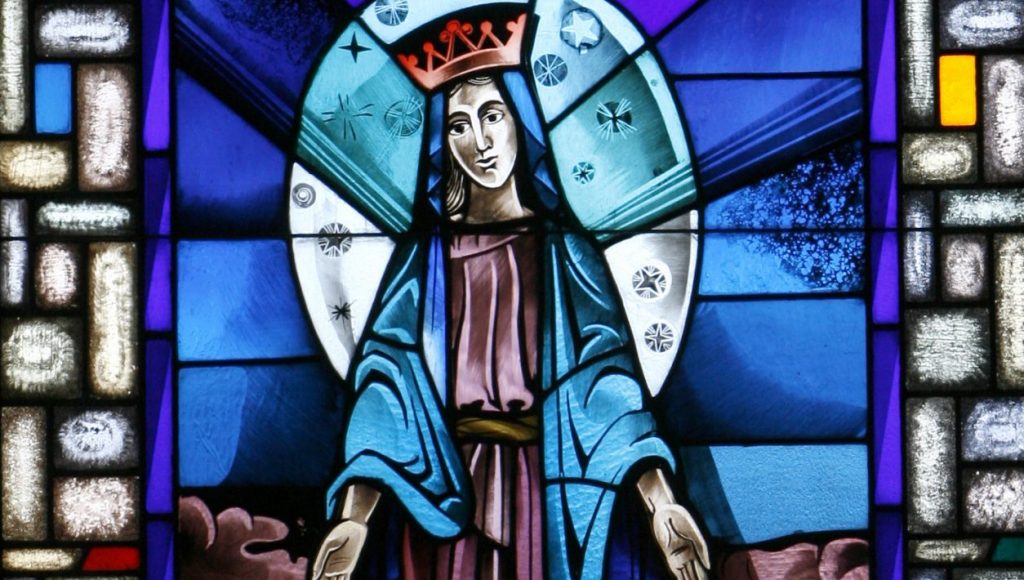Bishop Kevin Rhoades of Fort Wayne-South Bend said Thursday that the alleged visions and revelations known as “Our Lady of America” cannot be said to be of supernatural origin, and that public devotion to “Our Lady of America” is not permitted for Catholics.
Sister Mary Ephrem Neuzil of the Congregation of the Sisters of the Most Precious Blood of Jesus began having what seemed like mystical experiences, including inner locutions and visions of the spirit, around 1938. She revealed these to her confessor in 1948, and they became a devotion to Mary as “Our Lady of America” in 1954.
Sr. Neuzil said the Blessed Virgin began appearing to her in 1956 in Rome City, Ind., about 40 miles northwest of Fort Wayne.
The alleged visions and messages from Mary and from St. Joseph continued through 1959, in a number of locations. After 1959, she said Our Lady communicated with her primarily by locutions, until her death in 2000.
Bishop Rhoades agreed in 2017 to conduct an investigation into the alleged apparitions. The bishop issued to other U.S. bishops a statement May 7 on the investigation, which was obtained by CNA, along with a July 2019 decree on the matter.
In the statement, Rhoades said that Sr. Neuzil “was honest, morally upright, psychologically balanced, devoted to religious life and without guile.” He added that she had “signs of imperfection, but no evidence that she was the perpetrator of a hoax or the victim of delusion.”
“What she communicated about her alleged experiences, she believed to be true, and her communication of those experiences are filled with humility and forthrightness,” he added.
The bishop noted there are numerous reports of conversions, spiritual refreshments and consolations, and even some physical healings related to the alleged apparition. He added, though, that “we cannot conclude that any of these events are conclusive enough to warrant certification as miracles. It seems likely that in such personal contexts of faith and prayer, God's graces were received.”
While “much of what is expressed” in the alleged revelations “does not contain any doctrinal error,” Bishop Rhoades wrote that there is a claim of St. Joseph as “'co-redeemer' with Christ for the salvation of the world … which has never been expressed as Catholic doctrine and must be seen as an error.”
He reported that Sr. Neuzil's spiritual director, Archbishop Paul Leibold, wrote in 1970 that he was unable to make a judgement on the supernatural nature of her visions, and that while he had helped her in promoting them as a “private devotion,” he had never acted “to promote her devotion publicly.”
“Looking at the nature and quality of the experiences themselves, we find that they are more to be described as subjective inner religious experiences rather than objective external visions and revelations,” Bishop Rhoades wrote.
“Thus, while it may be said that there is possibly an authenticity to Sister Neuzil's subjective religious experience, we do not find evidence pointing to her experience as being in the category of objective private revelation.”
The bishop and his investigatory commission found that “her experiences were of a type where her own imagination and intellect were involved in the formation of the events. It seems that these were authentically graced moments, even perhaps of a spiritual quality beyond what most people experience, but subjective ones in which her own imagination and intellect were constitutively engaged, putting form to inner spiritual movements. However, we do not find evidence that these were objective visions and revelations of the type seen at Guadalupe, Fatima and Lourdes.”
Bishop Rhoades' judgement was issued in the July 29, 2019 decree, which was signed also by Fr. Mark Gurtner, then-chancellor of the Diocese of Fort Wayne-South Bend.
The five other bishops where the purported visions were said to have occurred – Archbishop Dennis Schnurr of Cincinnati, Archbishop Allen Vigneron of Detroit, Bishop Timothy Doherty of Lafayette in Indiana, Bishop Thomas Olmsted of Phoenix, and Bishop Daneil Thomas of Toledo in Ohio – each concur with Bishop Rhoades' findings and conclusions.
The six bishops had in 2017 asked the US bishops' conference to investigate the alleged apparitions, considering that inquiries were being received about the alleged apparition and its purported request for a procession of the nation's bishops and that a statue of Our Lady of America be placed in the Basilica of the National Shrine of the Immaculate Conception.
The Congregation for the Doctrine of the Faith advised that it be conducted by one of the bishops, and Bishop Rhoades agreed to do so.
He received documentation of Sr. Neuzil's correspondence the following year, and he conducted the evaluation with a commission of theological and canonical experts. They also gathered personal interviews with witnesses who knew Sr. Neuzil.
The procedure for the investigation was carried out in accordance with the Congregation for the Doctrine of the Faith's 1978 "Norms regarding the manner of proceeding in the discernment of presumed apparitions or revelations."
Some bishops have permitted the public display of statues of Our Lady of America, and then-Msgr. Liebold had given an imprimatur to a prayer attached to the devotion in 1963.
The six bishops wrote May 7 that “given this history of prayers and religious articles being given approval by competent ecclesiastical authority, the use of such prayers religious articles may continue as a matter of private devotion, but not as a public devotion of the Church.”
“Indeed, such private devotion would be consistent with the history of the United States of America being dedicated to Our Lady,” they added.
However, “such private devotion should in no way imply approval or acceptance of purported revelations, visions, or locutions attributed to Sister Mary Ephrem (Mildred) Neuzil other than as her own subjective inner religious experiences.”
A spokesperson for the Diocese of Fort Wayne-South Bend told CNA that “the conclusion of Bishop Rhoades and the other five bishops pertains to the entire Church. The same would have been true if the decision were in the affirmative.”

